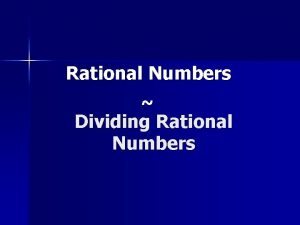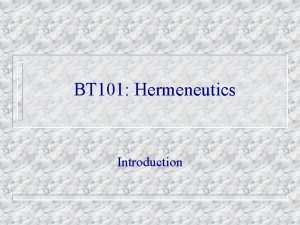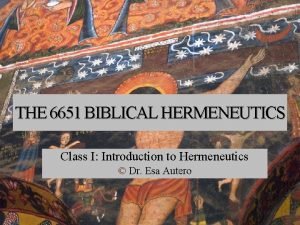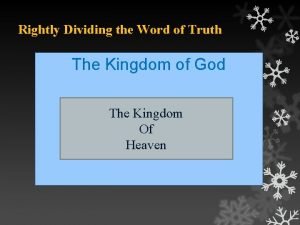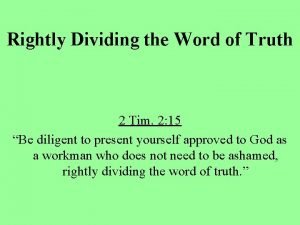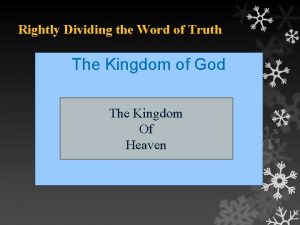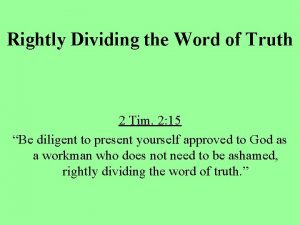HERMENEUTICS Rightly Dividing the Word of God Hermeneutics























- Slides: 23


HERMENEUTICS Rightly Dividing the Word of God Hermeneutics Theme verse Nehemiah 8: 8 -They read from the book, from the law of God, translating to give the sense so that they understood the reading.

HERMENEUTICS Rightly Dividing the Word of God LESSON TWO: Methods, Rules and Principles of Interpretation

HERMENEUTICS Rightly Dividing the Word of God Methods, Rules and Principles of Interpretation Methods The Need for a Method. 1. The Bible is a normal message even though God is the author. 2. The Bible is original in its message. 3. God revealed His thoughts through men in the Bible. 4. The message of the Bible is written in everyday, human language that can be understood. 5. To interpret the Bible is to explain its meaning or message. 6. The Bible must never be misinterpreted.

HERMENEUTICS Rightly Dividing the Word of God Methods, Rules and Principles of Interpretation Methods Harmful Methods. 1. Mystic Method. To discard the literal for the spiritual. 2. Allegorical Method. To teach by symbols and figures. 3. Superstitious Method. Having zeal but not according to knowledge.

HERMENEUTICS Rightly Dividing the Word of God Methods, Rules and Principles of Interpretation Methods Harmful Methods. 4. Ecclesiastical Method. “Let the church authorities tell us. ” 5. Dogmatic Method. To proof-text or to eisegete. 6. Rational Method. This is “to treat logic as the only tool. ” 7. Literal Method. To “make every text have only one literal meaning. ”

HERMENEUTICS Rightly Dividing the Word of God Methods, Rules and Principles of Interpretation Methods The Deductive Method. 1. This means to begin with the general facts and instances and then drawing conclusions. 2. God has revealed His message to mankind in two ways: a. General revelation (nature, the creation). b. Specific revelation (the Bible).

HERMENEUTICS Rightly Dividing the Word of God Methods, Rules and Principles of Interpretation Rules of Interpretation A. Every passage has one meaning, never two contradictory ones. B. The most simple and obvious meaning of any passage is usually the correct one. C. Always allow the author’s own explanation of a passage stand. D. Always interpret a passage in harmony with the context.

HERMENEUTICS Rightly Dividing the Word of God Methods, Rules and Principles of Interpretation Rules of Interpretation E. An interpretation of a passage should always conform to the environment of the author. F. Each passage must be in harmony with all other passages. G. Allow one passage to help explain another passage. H. A passage must be interpreted in harmony with any idioms it contains. I. All passages on any given subject must be studied for a full understanding of that subject.

HERMENEUTICS Rightly Dividing the Word of God Methods, Rules and Principles of Interpretation Rules of Interpretation J. Observe the proper balance of scriptural truth. K. Let plain passages help determine the meaning of difficult ones. L. Rightly divide the book, the dispensations, the covenants and the settings. M. Rightly divide the language. N. Know the meanings of the words in the sentences. O. Know the limits of divine revelation.

HERMENEUTICS Rightly Dividing the Word of God Methods, Rules and Principles of Interpretation Original Languages. We must remember that the OT was given by God in the Hebrew language, and the NT was given by God in the Greek language. The original languages are the ultimate authority, not the various translations.

HERMENEUTICS Rightly Dividing the Word of God Methods, Rules and Principles of Interpretation Infallible and Authoritative. A vital principle: The Bible is the infallible, and divinely inspired, word of God. We must have true faith in the supreme authority of the Scriptures. God's word must be the final authority in our lives. See 2 Tim. 3: 16, 17.

HERMENEUTICS Rightly Dividing the Word of God Methods, Rules and Principles of Interpretation The Law of Rationality. We must abide by the law of rationality; that is, we must only draw conclusions that are warranted by the evidence. Always remember, however, that logic is merely a tool. It does not provide content. The Bible is--and always will be--the content.

HERMENEUTICS Rightly Dividing the Word of God Methods, Rules and Principles of Interpretation Context. We must make proper use of the context of any statement of Scripture. When we pull a text out of its proper context in an effort to prove a point, we are "handling the word of God deceitfully" (2 Cor. 4: 2; cf. 2 Tim. 2: 15).

HERMENEUTICS Rightly Dividing the Word of God Methods, Rules and Principles of Interpretation Rules of the Setting (or of Context). a. Who is doing the speaking or the writing? b. To whom is the command or observation given? c. About whom is the passage speaking? d. When was the passage in question spoken? e. Where was the speaker when the message was given? f. What were the circumstances about the statement spoken? g. Why is the passage included in its context?

HERMENEUTICS Rightly Dividing the Word of God Methods, Rules and Principles of Interpretation A Proper Attitude. The Bible is understood by spiritual receptivity as much as by intellectual effort and scholarship. We must strive to reach a balance regarding this important principle. We must have minds and hearts that are willing to receive what the Bible teaches, and we must exercise intellectual effort. It takes both to fully understand God's wonderful word.

HERMENEUTICS Rightly Dividing the Word of God Methods, Rules and Principles of Interpretation A Proper Attitude (notice the following): 1. We must be noble ("fair-minded") (Ac. 17: 11). 2. We must humble ourselves as "little children" as we hear and study God's word (Mt. 18: 1 -4; 11: 25, 26). 3. We must have a good heart (Lk. 8: 9 -18). 4. We must love the truth (2 Th. 2: 8 -12). 5. We must hunger and thirst after God's word (Mt. 5: 6). 6. We must be diligent to rightly divide the Scriptures (2 Tim. 2: 15).

HERMENEUTICS Rightly Dividing the Word of God Methods, Rules and Principles of Interpretation Meditation. We must meditate on the word of God daily. Meditation upon the Scriptures is critical to successful Christian living and to arriving at a proper interpretation of the biblical text. The Bible is a storehouse of treasures. See Jo. 1: 8; Psa. 119: 97 -100; 1 Tim. 4: 13, 15; Phil. 4: 8.

HERMENEUTICS Rightly Dividing the Word of God Methods, Rules and Principles of Interpretation Classifying Actions. We must recognize that there are temporary and permanent aspects to consider regarding biblical authority. In other words, simply because an action was authorized at one time for a certain person or group does not necessarily mean that we have authority for that same action today.

HERMENEUTICS Rightly Dividing the Word of God Methods, Rules and Principles of Interpretation Classifying Actions. The Bible records: 1. Some actions that are sinful. 2. Some actions were TEMPORARY and OPTIONAL. Paul circumcised Timothy (Ac. 16: 3). 3. Some actions were TEMPORARY and REQUIRED. Earnestly desiring miraculous gifts (1 Cor. 12: 31).

HERMENEUTICS Rightly Dividing the Word of God Methods, Rules and Principles of Interpretation Classifying Actions. The Bible records: 4. Some actions that are PERMANENT and OPTIONAL. They gave beyond their ability (2 Cor. 8: 3). 5. Some actions that are PERMANENT and REQUIRED. To repent and be baptized (Ac. 2: 38).

HERMENEUTICS Rightly Dividing the Word of God Methods, Rules and Principles of Interpretation Difficult Passages. The last principle of Bible interpretation: We must acknowledge that there are some difficult things to understand in God's word. All should agree that many things in Scripture are plain, simple, and easy to understand. However, that God has made some things hard to understand (2 Pet. 3: 15, 16).

HERMENEUTICS Rightly Dividing the Word of God NEXT TIME… Types of Language Used A. Periods of Revelation. Patriarchal, Mosaic, and Christian periods. B. Different Genres to be Studied. The Importance of the Setting. C. The Types of Language Used. Literal and Figurative language. Figures of speech.
 Rightly dividing the word of truth meaning
Rightly dividing the word of truth meaning Word of truth baptist church
Word of truth baptist church Multiplying and dividing rational numbers jeopardy
Multiplying and dividing rational numbers jeopardy Critical race theory tenets
Critical race theory tenets Geisteswissenchaften
Geisteswissenchaften Hermeneutics quiz
Hermeneutics quiz Hermeneutics 101
Hermeneutics 101 Hermeneutics class
Hermeneutics class Hermeneutic circle
Hermeneutic circle Multiplying and dividing fractions word problems
Multiplying and dividing fractions word problems Dividing fraction word problems
Dividing fraction word problems Hát kết hợp bộ gõ cơ thể
Hát kết hợp bộ gõ cơ thể Bổ thể
Bổ thể Tỉ lệ cơ thể trẻ em
Tỉ lệ cơ thể trẻ em Chó sói
Chó sói Tư thế worm breton là gì
Tư thế worm breton là gì Chúa yêu trần thế
Chúa yêu trần thế Các môn thể thao bắt đầu bằng tiếng nhảy
Các môn thể thao bắt đầu bằng tiếng nhảy Thế nào là hệ số cao nhất
Thế nào là hệ số cao nhất Các châu lục và đại dương trên thế giới
Các châu lục và đại dương trên thế giới Cong thức tính động năng
Cong thức tính động năng Trời xanh đây là của chúng ta thể thơ
Trời xanh đây là của chúng ta thể thơ Cách giải mật thư tọa độ
Cách giải mật thư tọa độ


